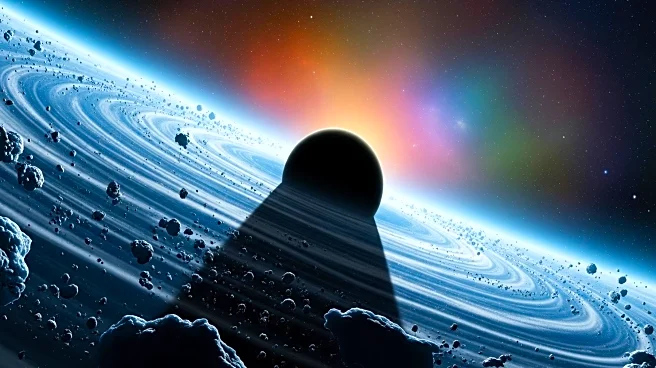What is the story about?
What's Happening?
Researchers Konstantin Batygin and Mike Brown from the California Institute of Technology have proposed the existence of a ninth planet in the solar system. This hypothesis emerged after observing unusual patterns in the Kuiper Belt, a region beyond Neptune filled with small, icy bodies. The researchers noted that six Kuiper Belt objects are clustered together, following elliptical orbits that deviate from the solar system's plane. The odds of such an alignment occurring by chance are estimated to be one in 15,000. Batygin and Brown suggest that a large, unseen planet could be exerting gravitational influence on these objects, causing their peculiar orbital patterns.
Why It's Important?
The potential discovery of a ninth planet could significantly alter our understanding of the solar system's structure and dynamics. If confirmed, this planet would be much larger than Pluto, which was reclassified as a dwarf planet in 2006. The existence of such a planet could provide insights into the formation and evolution of the solar system, particularly in its outer regions. It may also impact the classification and study of other celestial bodies within the Kuiper Belt, influencing future astronomical research and exploration missions.
What's Next?
Further observations and studies are needed to confirm the existence of this proposed ninth planet. Astronomers may employ advanced telescopes and space missions to gather more data on the Kuiper Belt and its objects. If the planet is detected, it could lead to a reevaluation of planetary definitions and classifications. The scientific community will likely engage in discussions and debates regarding the implications of this discovery, potentially influencing future research priorities and funding.
Beyond the Headlines
The hypothesis of a ninth planet raises questions about the criteria used to define planets and the processes that govern their formation. It also highlights the limitations of current observational technologies in detecting distant celestial bodies. The potential discovery could spark interest in revisiting the debate over Pluto's status and the broader criteria for planetary classification. Additionally, it may inspire public interest and educational initiatives focused on astronomy and space exploration.















